 Author photo by Abigail Kibler
Author photo by Abigail Kibler
.
Y
ou remember it as a holiday weekend at camp, an outdoors club your grandfather and a few of his friends and brothers started in the early 1900s. It’s the summer of 1962 and friends and families, who’ve descended from those nine original members of Royal Outing Club, mill around the grounds in rural south western Pennsylvania. Someone starts a bocce game on the lawn, others play cards, drink beer and smoke cigarettes. They lounge around on lawn chairs or the wooden porch swing which hangs from the branch of giant tree near the mess hall. The smell of roast meat emanates from the old wooden building and laughter and conversation rise and fall ubiquitously. Horseshoes clank and thud in the dusty pits behind the beer-garden where old men play poker and drink an amber liquid from tiny glasses. Their cigars make a canopy of oaken smoke over a low hanging black walnut branch which shades the lichened table where they sit. Bright glints of afternoon light chink through the foliage here and again. Inside the crowded beer garden, nutshells crunch under your sandals, bigger kids push past you. Teenage girls, hips swathed in plaid peddle-pushers, sway rhythmically to the beat that rolls from the grill of the Seeburg juke box.

You and some girls your age run up to the ladies’ bunk to play. It’s the kind of afternoon where you can wander as a pack for hours and someone or other’s mom or dad peeks in on your game when they visit the powder room or stroll down to the creek-side. The cool cement floor and spare block walls of “the house” are the perfect setting for a game of hospital—this and the rows of metal WWII cots with their sagging mattresses. It’s quiet here too, with all of the grownups down at the bar or out on the lawn, even the napping babies become a part of your game of hospital. The children’s ward is in the back room where cribs stand end to end those patients sleep soundly. Ailing 3, 4 and 5 year old patients with measles, river fever, or snake bites convalesce and suffer in the camp hospital. You recall that you and Regina Gemperle or maybe Susie Larkin doctored and nursed with some authority and aplomb. You minister to the sick moving somberly from bed to bed. You are tall enough to reach their pale slight faces and feel for fever, offer a sip of water or medication, bandage an injured wrist. Your mother’s magnifying mirror and other instruments, curling irons and shower caps become the tools of your trade.
Years later you are told by the ladies that so many children were born in 1957 because the summer before your mother taught everyone the rhythm method of birth control. The result of these instructions were you and at least six other children.
.
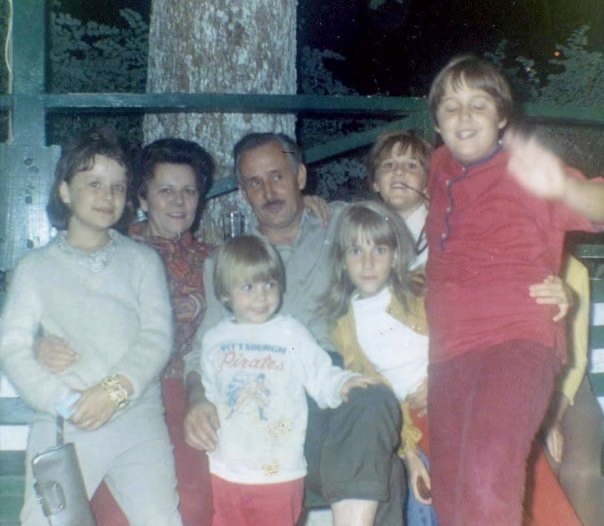
The playing hospital in the women’s bunkhouse part of the day is the clearest in your memory. Maybe you needed a nap or maybe the afternoon grew especially hot and therefore you recall only the blurred moments. You’re not certain as to how or when the day changed profoundly. What you do remember is this day included your first awareness of your mother’s being drunk.
On the back stoop of the bunkhouse your dad holds you in his arms as you sit together on the cool cement slab. You lean your head away from your mother’s distorted face, her mouth coming toward you for a kiss. She comes in close making you swoon and whimper.
“Aaawwwhatsamatterdoll? Don’t cry,” her speech slurs and you catch the scent of sour breath with her words. You are aware of grownups laughing on the lawn and the afternoon suddenly green and bombed with intoxicating heat and sounds which bore into your small head. Your mother’s never been like this; all of the world tips on its edge, if not for the sure arms of your dad you’d collapse on the lawn. Years later, you will blame your nightmares in which your mother is replaced by a shaved-head-Nazi, on this day and that is probably exactly where those nightmares began.
.
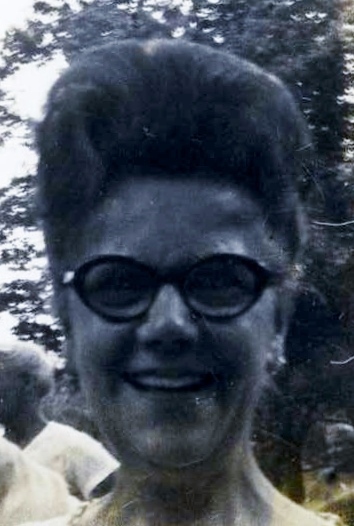
The gravel road from camp leads out to the Buhl Bridge on old Route 8 and just a few steps from there you can double back on Cottage Lane as it runs with the tracks for a time until it turns toward the tall stalks of corn and leads to the little cottages. Each place is brightly painted and one of these belongs to your Aunt Cle and Uncle Dick. Your favorite is the white cottage with red decorations and the giant letter on its front. Today, you and your father do not stop to visit any of the cottagers. You have trouble keeping the rough chunks of gravel out of your white sandals and your stride is clumsy. No matter your appeal your father does not carry you. Only, he pulls you down the lane, the strap of your summer romper slipping from one shoulder, the buckle on your sandal rubbing a blister onto the side your foot. Your father does walk you through the labyrinth mowed into the tall weeds across from your uncle’s cottage and there you grow dizzier with each twist and turn of the maze, the tall grass moving in a haze of green with the soft shushing of an afternoon breeze which lulls you to doze. One day you will puzzle at the uncomfortable feelings games of hide-and-go-seek that grass maze calls up in you, how you are unable to play along with the other children.
.
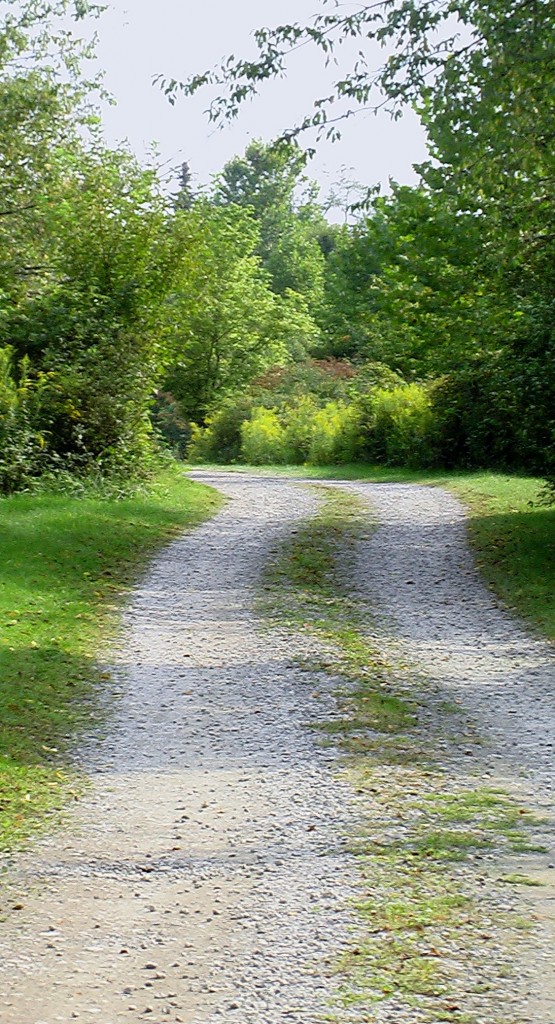
This is your father rescuing you from the upset of your drunken mother. He takes you for a walk ‘out the road’ and then back toward the cottages and finally, full circle, he walks you across the ball field back toward the camp grounds. The field needs a mow, overgrown barnyard and crab grasses scratch your drowsy feet and scrape your ankles. Ground bees lumber about your moist person. Your wee-self fills with weariness as you approach the back of the mess-hall knowing that opposite is the bunk-house where, in the darkened back room where the cribs are and the soft wooden floor and giant overhead fan. You will rest in your own little bunk with its pink pillow-case on top of the soft-worn Indian blanket. You are by now tired and troubled enough about your mom that you haven’t the energy for finding Tobie cigars with the kids, or beheading dandelions, or the touching of Monarchs, or finding blue fairies, or gathering Queen Anne’s lace. No time for spotting black snakes, hooking worms, or building sand castles creek-side. Your father has insisted that you walk with him and because you adore him you do your best to please him. Your soft light brown curls stick to the perspiration on your forehead and the slow buzz of a no-see-um sounds eternal in your ear.
At last the crepe soles of your sandals meet the scruff of the paved sidewalk leading to the bunk and your father scoops you into his arms. You rub your face into his neck. The damp cotton of his shirt smells of nicotine, sweat and dial soap, a somehow tender and comforting scent. Years after he dies the smell of cigarettes still gives you a sense of security and, you believe, adds to your long struggle to stop smoking.
Your eyelids grow heavy and you are letting yourself slack into afternoon dreams when you hear the distant sound of your mother, “Oh, Stuart,” she is saying and something more you cannot make out as she staggers near.
“It’s alright, Rita,” your father tells her, setting you down on your feet and taking your hand once again. To you he says, “Come on, Babydoll. Let’s walk around the block again.”
You cry. You tantrum. All protests are ignored by your gentle father and after a visit to the ladies’ bathroom, once again you walk with him around the tracks and along the lane where the earth is a gravelly gray clay which traps puddles that will last as long as summer. Your toes are black with dust and your sandals are now a dirty white. This time around a train passes sounding its horn into your sunburnt temples. One of the cottagers drives slowly down the lane heeding the yellow “5 miles per hour” sign and rolls to a slow stop next to you and dad. It is your aunt and uncle and your father picks you up this time allowing you to sleep deeply on his warm shoulder. The sound of his voice chatting with these passersby tumbles up to your ears from his warm chest and soon you are in a deep sleep. He carries you the rest of the way back to camp. The only sound his melodic random whistle and the stirring of the cicada’s call as the warm afternoon gives way to evening.
.
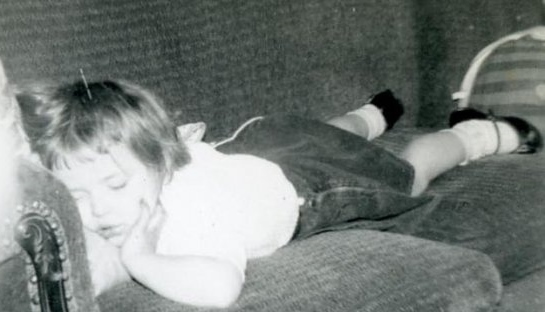
Years later you will recall this experience while talking with your sister and you will ask if she remembers the time mom was so drunk and how it upset you to the point where dad had to take you for a walk around the block at camp.
She will laugh at your recollection and explain, “Mom wasn’t drunk. Dad was walking you around because you kids got into Sis’ sleeping pills. You were playing hospital in the bunkhouse,” Later other old friends will fill in the blanks for you.
“We called doctor Klatman and he wanted all the kids to take syrup of ipecac.”
“Your dad refused to make you throw up because you hated it so.”
“He decided to walk you around until the effects of the drug wore off.”
“You were five, I think. Our Carol was just a baby at the time. Just two, I think.”
“No. Your mom was not drunk. She wasn’t even drinking whiskey. Just a few beers.”
Your mom is gone over a decade when you learn the truth of what happened that day and you have a vague recollection of perhaps even being the person who distributed the medications. You do remember that as a child you loved to explore, especially into the business and belongings of others. Your sister’s make-up, the old photos your mother stowed in the cedar chest, your brother’s girlie magazines.
You remember some things now and it makes sense that the medication was the culprit making you light headed and sleepy. You see now the deep affection that your father showed for you that day. The cloak of unfaltering devotion from your father bolsters you even today some 40 years after his death.
.
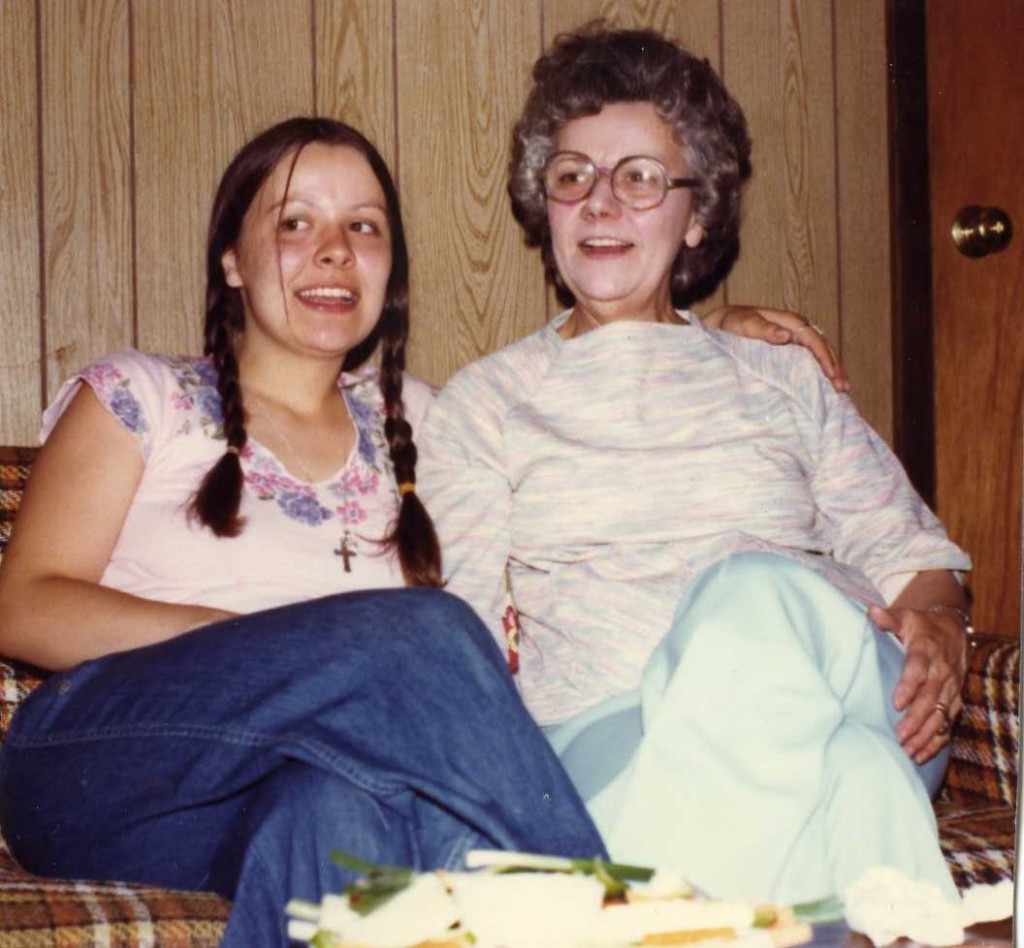
That summer marks the first but not the last time you were inebriated. You know that your condition then made you somehow able to see something you’d never seen in your mother. Drunkenness. It was something you’d never fail to distinguish again. You would also never fail to forgive it, not in yourself, not in your mother.
—Meg Harris
.
Meg Harris grew up in southwestern Pennsylvania but has lived in New England since the 1980s. Recently Meg and her husband took occupancy of a home in Connecticut that was purportedly a tearoom in the 1700s and originally a “great barn” in the 1680s. Today, “Sol’s Path” is Meg’s writing retreat. A chap of Meg’s poems, Inquiry into Loneliness is forthcoming this month from Crisis Chronicles; her stories and poems have appeared in both print and online journals. This is the first time Meg’s creative nonfiction has been published.
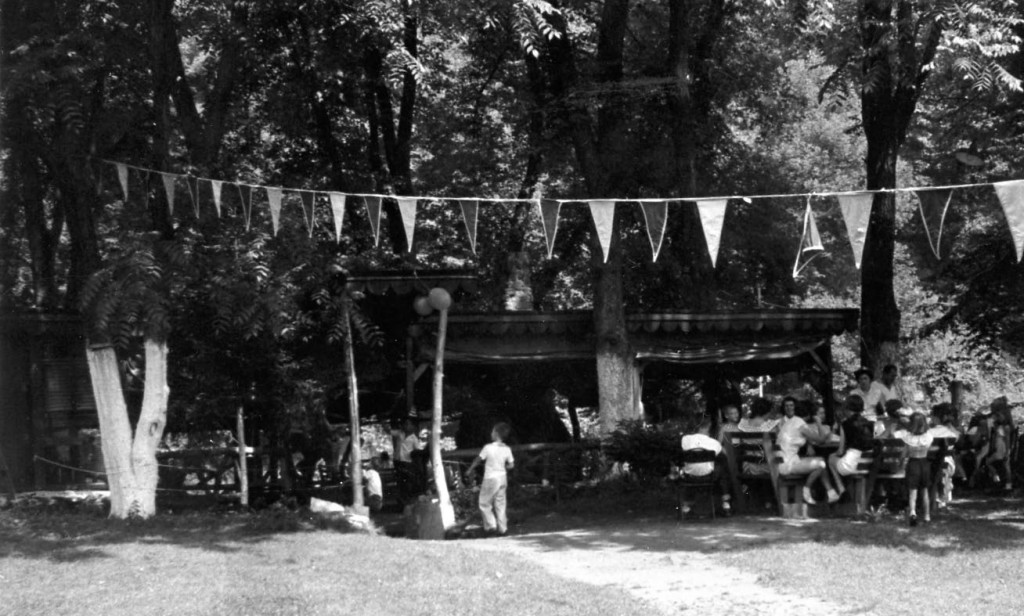
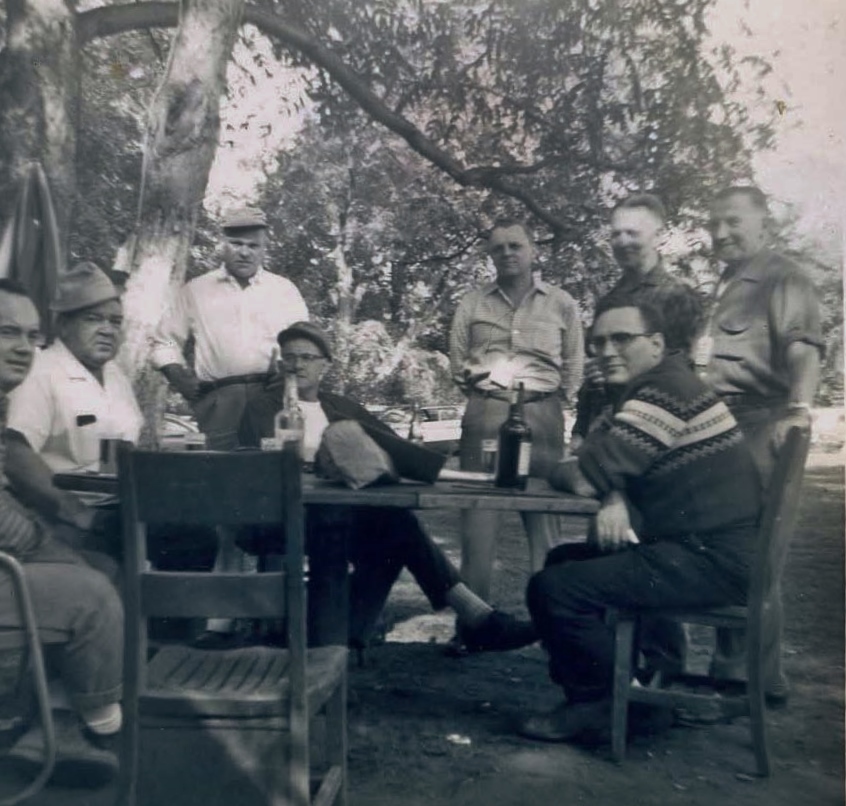
This lifted my spirits and the photos are precious!
What a wonderful piece.
Such a haunting but also funny essay, Meg!
Your creation is timeless! Inebriated souls continue to find solace in the afternoon shadows found along side the ROC Beer Hall